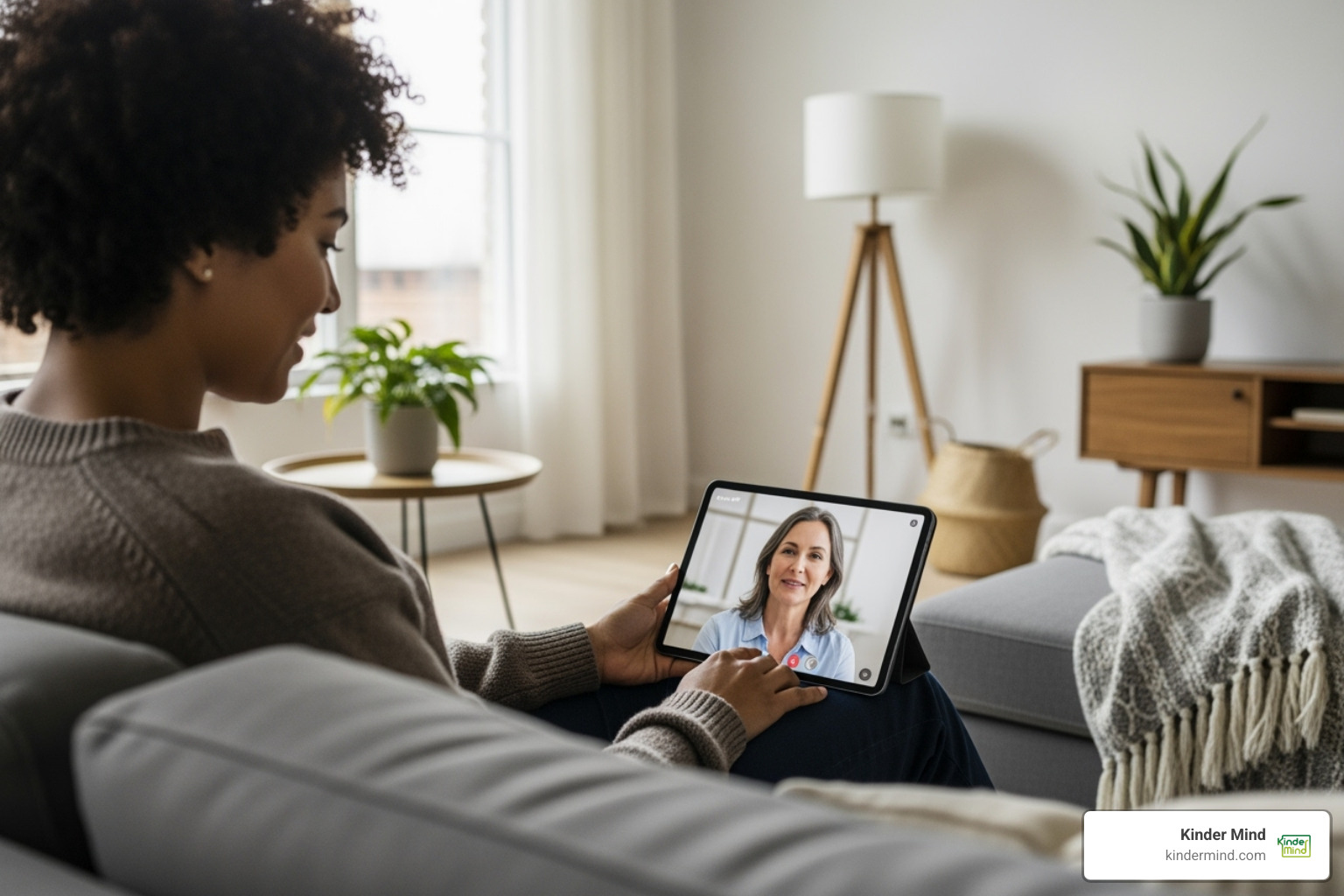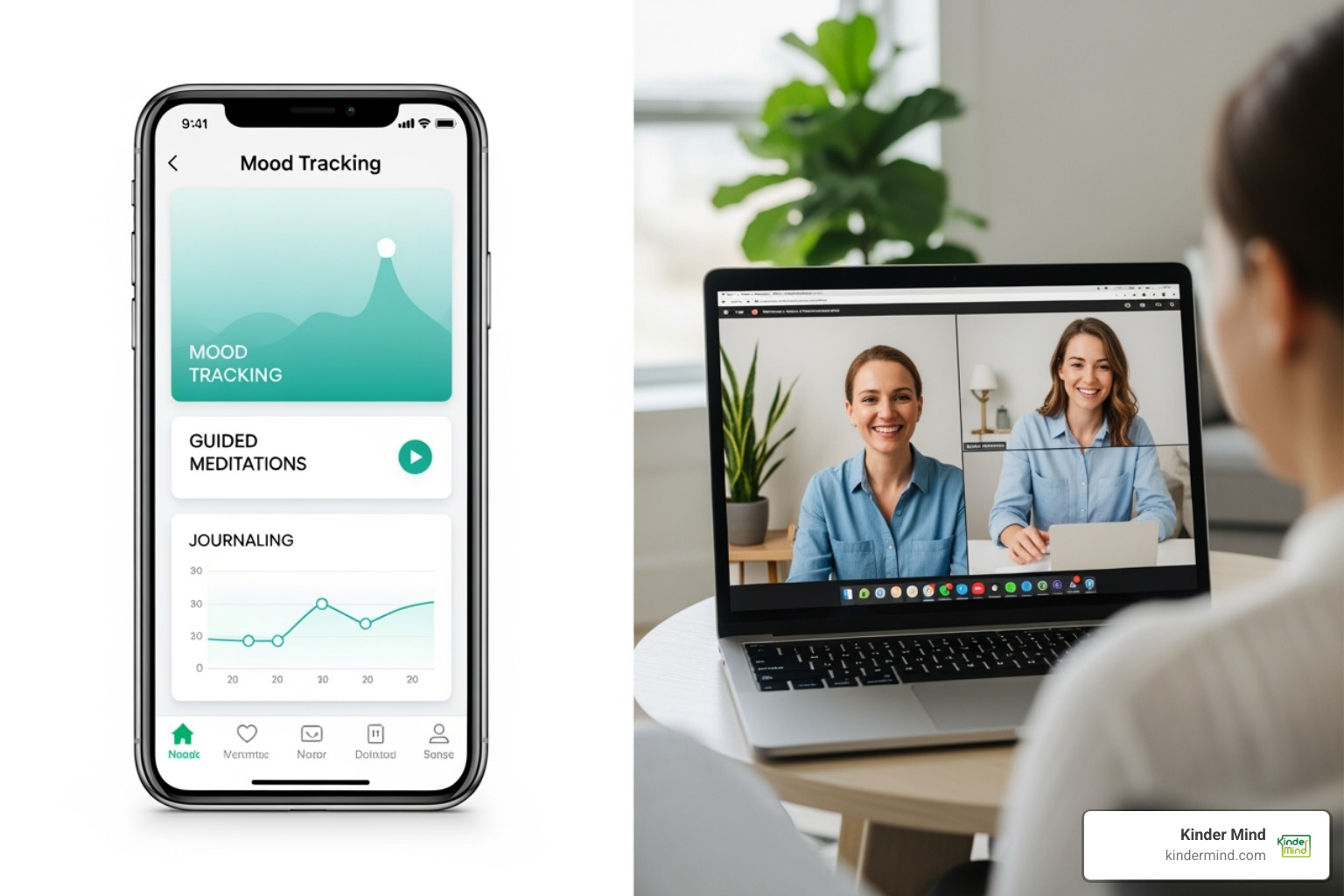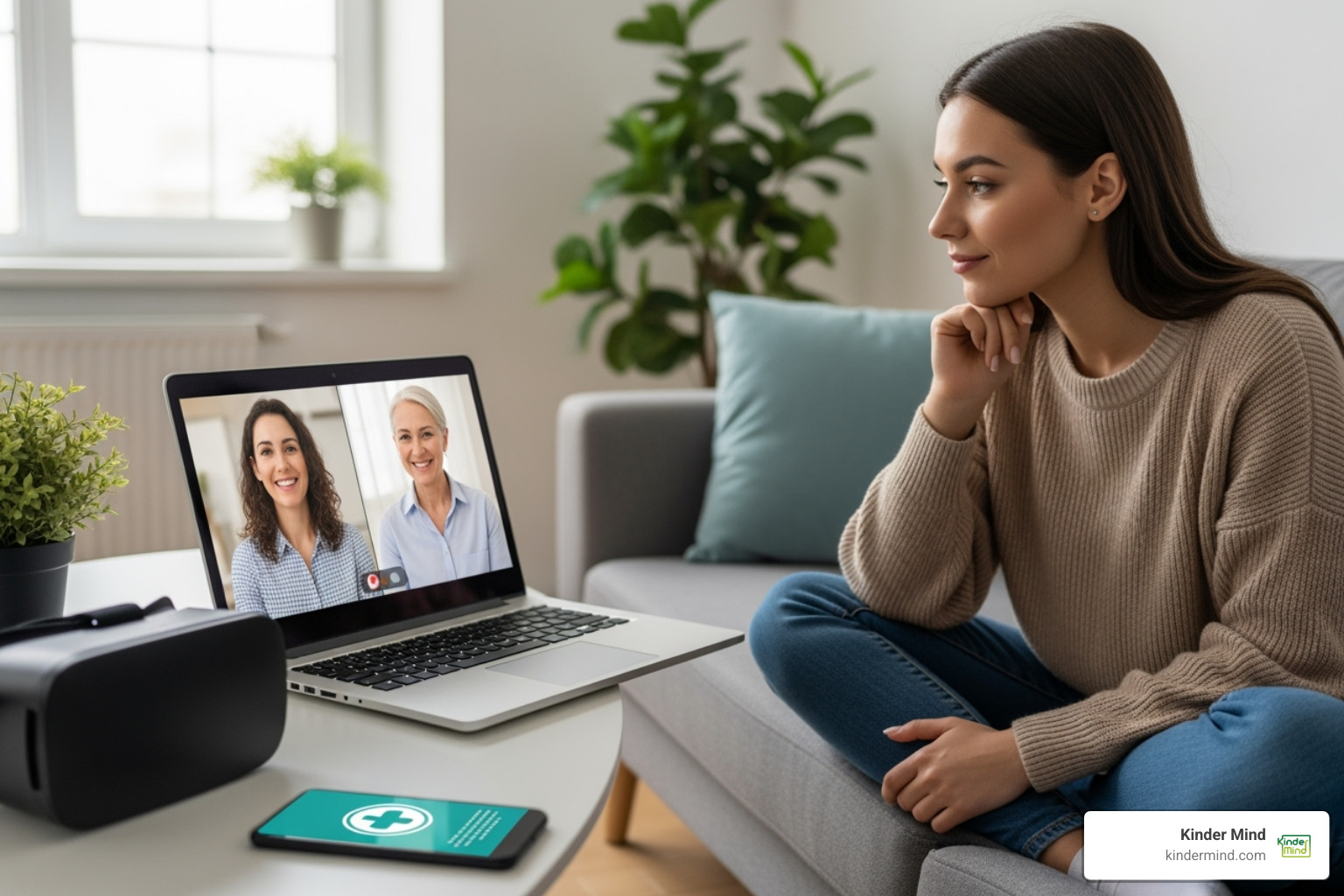Finding Your Virtual Lifeline: A Comprehensive Guide to Online Mental Health Support
Why Virtual Mental Health Support Matters Now More Than Ever

Virtual mental health support connects you with therapists, counselors, and peer support through your phone, tablet, or computer—eliminating the barriers of distance, cost, and scheduling that often prevent people from getting help.
Quick Overview: What You Need to Know
- What it is: Clinical mental health services delivered through video calls, phone sessions, text messaging, or online platforms
- Who it's for: Anyone experiencing anxiety, depression, stress, or other mental health challenges—including youth, students, veterans, and specific cultural communities
- How to access: Through online therapy platforms, mental health apps, government-funded programs, or your insurance provider
- Cost range: Free crisis support to government-funded programs to affordable subscription services
- Effectiveness: Research shows users experience an average 50% reduction in symptoms, with 95% satisfaction rates
Life can be tough, and getting help shouldn't add to that stress. That's the promise behind the rapid growth of virtual mental health services.
The pandemic forced mental healthcare to evolve practically overnight. What started as an emergency measure has become an integral part of how we access support. Online and phone mental health services now offer immediate, confidential help—available 24/7 from wherever you are.
The digital shift solved real problems. It removed the need to take time off work, commute to an office, or put off help because traditional therapy felt too expensive or complicated.
Virtual care allows you to connect with a qualified therapist on your lunch break, message a counselor when anxiety strikes at 2 AM, or join a support group from home. For people in rural areas, those with mobility challenges, or anyone who values privacy and flexibility, this accessibility is life-changing.
This guide walks you through everything you need to know about virtual mental health support—from understanding what services exist to finding affordable care that fits your life. Whether you're exploring options for the first time or looking to switch from in-person therapy, you'll learn how to steer this landscape with confidence.
Understanding the Landscape of Virtual Mental Health Support
Getting mental health support used to mean booking an appointment weeks in advance, taking time off work, and sitting in a waiting room. Today, the landscape looks completely different—and much more accessible.
Virtual mental health support encompasses any clinical interaction between you and a healthcare provider that happens through digital communication technologies. It's a broad term that covers everything from video therapy sessions to text-based counseling to self-help apps you can use at 3 AM when anxiety strikes.
What is Virtual Mental Health Support and How Does It Work?
Think of virtual mental health support as mental healthcare that comes to you, rather than you going to it. The core aim remains the same as traditional therapy: providing person-centered, quality care that's equitable, safe, and effective. The difference is simply how that care reaches you.
The beauty of virtual support lies in its flexibility. You might have a video call with your therapist from your living room, creating an experience that feels remarkably similar to sitting across from them in an office—just without the commute. Some people prefer audio-only sessions, which work perfectly if your internet connection is spotty or you simply feel more comfortable talking without being on camera.
Text-based therapy and asynchronous messaging offer another option entirely. You can write out your thoughts when they're fresh, take time to articulate exactly what you're feeling, and receive thoughtful responses from your therapist within an agreed timeframe. This approach works especially well if you find it easier to express yourself in writing or if your schedule makes real-time appointments difficult.
The pandemic accelerated what was already a growing shift toward digital care. What started as a necessity became a revelation for many people who had struggled with traditional barriers to accessing support. Geographic distance no longer matters. Time constraints become manageable. The stigma some people feel about walking into a therapist's office simply disappears. These innovations ensure you can connect with mental health professionals in ways that actually fit into your life.
The Spectrum of Online Services: From Therapy to Self-Help

The world of online mental health support is wonderfully diverse. You're not limited to just one type of service—there's truly something for everyone, depending on your needs, preferences, and what you're dealing with right now.
One-on-one teletherapy is what most people picture when they think of virtual mental health support. These are live video or audio sessions with a licensed therapist, just like traditional therapy but delivered through your screen. You can address everything from depression and anxiety to trauma and relationship challenges. At Kinder Mind, we offer both virtual and in-person therapy options, giving you the flexibility to choose what works best for you.
Online support groups create safe spaces where you can connect with others who truly understand what you're going through. These peer-led groups bring together people facing similar struggles, whether that's anxiety, depression, bipolar disorder, or trauma. Some groups have trained moderators, while others operate as anonymous forums. There's something powerful about realizing you're not alone in your experience.
Guided self-help programs offer structured approaches you can work through at your own pace. Many are based on Cognitive Behavioural Therapy (CBT), a therapeutic approach with strong research backing its effectiveness. These programs typically include interactive modules, exercises, and tools to help you develop coping strategies. Some include brief check-ins with a therapist to keep you on track.
Mental health apps have exploded in popularity, and for good reason. They put support tools right in your pocket—mood tracking, mindfulness exercises, breathing techniques, and CBT-based strategies you can access anytime. The best apps are reviewed for credibility and data privacy, so you know your information stays secure.
Psychiatry and medication management services have also moved online. Through video consultations, psychiatrists can evaluate your needs, prescribe medications, and monitor how they're working for you. This makes ongoing medication management much more convenient, though some limitations exist around prescribing certain controlled substances.
Peer support connects you with trained listeners who have lived experience with mental health challenges. Sometimes talking to someone who's been there—who truly gets it—provides a different kind of comfort than clinical therapy offers.
All of Kinder Mind's services are based on clinically tested and proven approaches, ensuring you receive quality care whether you choose virtual or in-person support.
Emergency and Crisis Support in the Virtual World
Here's something crucial to understand: while virtual mental health support offers incredible accessibility for ongoing care and support, it has important limitations when it comes to immediate, life-threatening emergencies.
If you or someone you know is in immediate danger or experiencing a life-threatening crisis, your first action should always be to call 911 or go directly to the nearest emergency room. Standard virtual therapy sessions simply aren't designed to handle acute safety crises—and your therapist will tell you the same thing.
That said, the virtual world does provide vital lifelines for moments when you need immediate support but aren't in imminent physical danger.
The 9-8-8: Suicide Crisis Helpline operates 24/7 across the country, offering bilingual, trauma-informed support to anyone experiencing suicidal thoughts or emotional distress. This service is confidential, and the counselors are specially trained in crisis intervention.
Crisis hotlines exist across the country, providing round-the-clock confidential support. These lines connect you with trained counselors who can help you through difficult moments, develop safety plans, and connect you with additional resources.
Text-based crisis support offers another avenue for reaching out, which can feel less intimidating than a phone call for some people. Services specifically designed for youth allow them to text for immediate support when they're struggling.
Many communities also offer culturally specific crisis lines that provide immediate mental health counseling in a culturally appropriate context, with some services available in multiple languages.
Some institutions offer virtual urgent care clinics for same-day support with non-life-threatening urgent concerns. These fill an important gap between regular therapy appointments and emergency room visits. However, they typically have specific eligibility criteria and limitations—for example, they cannot provide prescriptions for controlled substances like opioids or benzodiazepines.
The key distinction to remember: regular virtual therapy helps you develop coping strategies and work through challenges over time. Crisis services provide immediate intervention when you're in acute distress. Both are valuable, but they serve different purposes. Always prioritize emergency services when safety is at risk.
The Pros, Cons, and Effectiveness of Going Virtual
Let's be honest—deciding whether to try therapy online instead of sitting on an actual couch can feel like a leap of faith. You might wonder if staring at a screen can really create the same connection, or if it's just a convenient compromise. The truth? Virtual mental health support has both genuine strengths and real limitations, and understanding both will help you make the right choice for your situation.
Key Benefits: Accessibility, Convenience, and Privacy
The change that virtual mental health support has brought to mental healthcare isn't just about technology—it's about removing the obstacles that have kept people from getting help for far too long.

For someone in a rural town, hours from a specialist, virtual care eliminates geographic barriers, allowing them to connect with the right professional from their living room.
The convenience extends beyond location. You save time and money on commuting, and an hour-long appointment remains just an hour. This is a major benefit for parents needing childcare, people with mobility challenges, and busy professionals.
Scheduling flexibility is another game-changer. Many virtual platforms offer evening and weekend appointments that traditional clinics simply can't match. Being able to fit therapy into your actual schedule—rather than rearranging your entire week around it—makes continuing care so much more realistic.
There's also something quietly powerful about privacy and reduced stigma. For some people, the hardest part of seeking help is walking through that clinic door. Virtual sessions let you receive support from wherever you feel safe and comfortable, encouraging people to seek help sooner.
Perhaps most importantly, virtual care gives you a greater choice of therapists. You're no longer limited to whoever practices within driving distance. You can search for someone whose specialty, therapeutic approach, or cultural background truly resonates with you. Finding that "right fit" matters enormously to therapy's success, and virtual platforms expand your options dramatically.
These benefits combine to create something genuinely transformative: mental healthcare that actually fits into real people's real lives.
Potential Limitations and Important Considerations
Of course, virtual mental health support isn't perfect for everyone or every situation. Being aware of the potential challenges helps you set realistic expectations and determine if it's the right approach for you.
The digital divide remains a genuine barrier. Not everyone has reliable high-speed internet or a private space for video sessions. If your connection keeps freezing or dropping, it disrupts the flow of conversation and can be genuinely frustrating. A strong internet connection (above 10 mbps) makes a real difference. If you're unsure about your connection speed, you can click here to test your internet speed.
Privacy and security deserve careful attention. While reputable providers use platforms that comply with HIPAA regulations and employ strong encryption to protect your data, you also need to do your part. Make sure you're in a truly private space during sessions—not your car in a parking lot or a coffee shop with earbuds. Always verify a provider's security practices before sharing sensitive information.
It's also important to acknowledge that virtual therapy isn't suitable for all conditions. If you're experiencing severe mental health challenges like acute psychosis, severe eating disorders requiring inpatient care, or are at high risk of self-harm, you likely need a higher level of in-person monitoring and support. Virtual care works best for common conditions like anxiety, depression, and stress.
There are also prescription limitations to consider. Some virtual services cannot prescribe or renew certain controlled substances like opioids, benzodiazepines, or stimulants. If you need these medications, you may still require in-person consultations.
Finally, finding the right therapist—whether virtual or in-person—sometimes takes trial and error. Some people find that certain nuances of body language feel harder to pick up through a screen. If you try virtual therapy and it doesn't feel right, that doesn't mean therapy itself won't work for you. It might just mean you need a different format or a different therapist.
How Effective is Virtual Mental Health Support?
Here's the question that matters most: does virtual therapy actually work? The research is reassuringly clear.
Studies consistently demonstrate that virtual mental health support is just as effective as traditional in-person therapy for common conditions like anxiety, depression, and stress. This isn't just anecdotal—it's backed by rigorous clinical trials and real-world outcomes. For instance, users of digital mental health clinics have experienced an average 50% reduction in their symptoms, with 95% satisfaction rates and willingness to recommend the service to friends. Those numbers speak to genuine, meaningful improvement in people's lives.
The comparison to in-person therapy often surprises people. Many assume that face-to-face sessions must be inherently better, but the evidence doesn't support that assumption for most conditions. What matters more than the medium is the quality of the therapeutic relationship and your own engagement with the process. In fact, the accessibility and convenience of virtual care can actually improve engagement—when therapy is easier to attend, people are less likely to miss sessions or drop out of treatment.
High satisfaction rates reflect more than just symptom improvement. People genuinely appreciate the flexibility, privacy, and ease of access that virtual care provides. When therapy fits naturally into your life instead of feeling like another stressful obligation, it's easier to show up consistently and do the work.
Quality standards matter enormously in virtual mental health care. Leading institutions are actively involved in evaluating and improving virtual services, incorporating frameworks like the Quintuple Aim, which focuses on improving population health, enhancing patient experience, reducing costs, addressing clinician burnout, and advancing health equity. This ensures that virtual care isn't just convenient—it's person-centered, equitable, safe, and genuinely effective.
At Kinder Mind, all of our services are based on clinically tested and proven approaches. Whether you choose in-person or virtual sessions, you're receiving evidence-based care designed to create real, lasting change in your mental health and well-being. That commitment to quality isn't just a nice idea—it's the foundation of effective mental health support.
Navigating Access: Finding and Paying for Your Care
This section provides actionable steps for finding a qualified provider, understanding eligibility, and exploring payment options, including free and low-cost services available through Kinder Mind and public resources.
Who Can Benefit and What Are the Eligibility Criteria?
Virtual mental health support is designed for a wide array of individuals, making mental health care more inclusive than ever before. Generally, anyone experiencing common mental health challenges like anxiety, depression, or stress can benefit. However, specific services may have eligibility criteria based on location, age, or the nature of their condition.
- General Population: Adults experiencing low mood, mild to moderate depression, anxiety, stress, or worry are prime candidates for many virtual services and self-help programs.
- Specific Demographics: Many organizations and public health initiatives offer custom virtual support for:
- Youth and Children: Free, confidential support is often available for younger populations, with resources designed for their specific needs.
- Students: Many colleges and universities provide access to confidential virtual counseling services for their students.
- Veterans: Dedicated online resources and mobile apps are available to improve well-being for former members of the armed forces and their families.
- Diverse Communities: Culturally appropriate support is available through various helplines and virtual services for BIPOC, LGBTQ2S+, and other specific communities.
- Healthcare Workers: Specialized programs provide mental wellness support for those on the front lines.
- Geographic Restrictions: Many publicly funded services are geographically limited to certain states or regions. Private providers must also be licensed to practice in your state. Kinder Mind offers virtual services across numerous US states, including Alabama, Alaska, Arizona, Arkansas, California, Colorado, Connecticut, Delaware, Florida, Georgia, Hawaii, Idaho, Illinois, Indiana, Iowa, Kansas, Kentucky, Louisiana, Maine, Maryland, Massachusetts, Michigan, Minnesota, Mississippi, Missouri, Montana, Nebraska, Nevada, New Hampshire, New Jersey, New Mexico, New York, North Carolina, North Dakota, Ohio, Oklahoma, Oregon, Pennsylvania, Rhode Island, South Carolina, South Dakota, Tennessee, Texas, Utah, Vermont, Virginia, Washington, West Virginia, Wisconsin, and Wyoming.
- Age Requirements: While some services cater to all ages, others have specific age cut-offs, so it's always important to check.
It's essential to check the specific eligibility criteria of any service before attempting to access it to ensure it aligns with your needs and location.
How to Find a Qualified Virtual Mental Health Provider
Finding the right virtual mental health provider is a crucial step toward effective support. With so many options available, knowing where to look and what questions to ask can make all the difference.

Here's how to steer the search:
- Start with Kinder Mind: If you're looking for accessible, in-person or virtual mental health therapy services in the US, Kinder Mind provides a directory of qualified professionals. Our focus on affordable care and various payment options makes us a great starting point for many.
- Use Trusted Resources: Your primary care doctor can be an excellent source for referrals. Additionally, national non-profit organizations focused on mental health, like the National Alliance on Mental Illness (NAMI), often provide guidance and resources for finding care.
- Check Government Portals: In the US, the SAMHSA (Substance Abuse and Mental Health Services Administration) National Helpline and Treatment Locator can help you find low-cost or sliding-scale mental health care providers, including those offering online therapy.
- Vetting Credentials and Asking Questions: Once you've identified potential providers, do your homework.
- Licensure and Experience: NAMI advises researching a potential provider’s licensure, training, and experience. Ensure they are licensed to practice in your state.
- Specializations: Does the therapist specialize in the issues you're facing (e.g., anxiety, trauma, specific populations)?
- Therapeutic Approach: Are they trained in modalities that resonate with you (e.g., CBT, DBT, psychodynamic therapy)?
- Privacy and Security: Inquire about the security measures of their platform and how they ensure your privacy.
- "Fit": Don't hesitate to schedule an initial consultation to see if you feel comfortable and connected with the therapist. A good therapeutic relationship is key to successful outcomes.
By taking these steps, you can confidently find a qualified virtual mental health provider who meets your needs and preferences.
Understanding the Costs and Finding Affordable Options
One of the most significant advantages of virtual mental health support is the potential for increased affordability and diverse payment options, making care accessible to a broader population. Understanding the various cost models can help you steer this landscape.
- Insurance Coverage: Many insurance plans now cover virtual therapy sessions just as they would in-person visits. Always check with your provider to understand your co-pays, deductibles, and which therapists are in-network.
- Subscription Platforms: Some online services operate on a subscription model, offering unlimited messaging and a set number of live sessions for a weekly or monthly fee. This can be a predictable and cost-effective option for ongoing support.
- Per-Session Fees: Similar to traditional therapy, many virtual therapists charge a fee for each session. Some offer sliding-scale fees based on your income, which can make care more affordable.
- Free & Low-Cost Services: Government-funded programs and non-profit organizations often provide free or low-cost counseling and support services. Kinder Mind is committed to affordability and offers various payment options, including reduced-rate plans, to ensure cost is not a barrier to receiving quality care.
